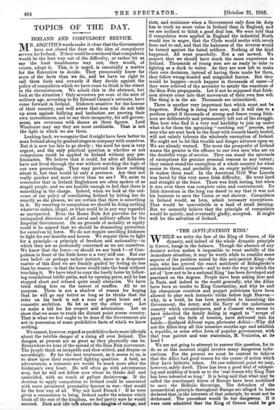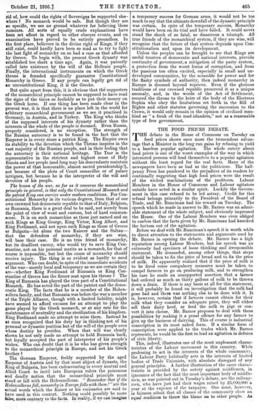' THE (ANTI-)PATRIOT KING.'
WHILE we write the fate of the King of Greece, of his dynasty, and indeed of the whole dynastic principle in Greece, hangs in the balance. Though the absence of any decisive action gullies it impossible to treat usefully of the immediate situation, it may be worth while to consider some aspects of the problem raised by this anti-patriot King—the man who has proved the exact antithesis of Bolingbroke's celebrated model monarch—and to note the way in which the art of ' how not to be a national King ' has been developed and practised on the Aegean. People have been asking here and in Paris, and indeed in the world generally, why the Allies have been so tender to King Constantine, and why he and his obsequious courtiers and puppet politicians have been allowed to play such fantastic tricks before high Heaven— why, in a word, he has been permitted to hamstring the Government, the Army, and the Navy of the unfortunate country which circumstances, and a Consort who seems to have inherited the family -failing in regard to " scraps of paper " and the faith of treaties, have delivered into his hands.—Quidquid deli-rant reges, plectuntur Achivi.—Why did not the Allies stop all this nonsense months ago and establish a republic, or some other form of popular government, with that true patriot and wise statesman, M. Venizelos, at its head We are not going to attempt to answer this question, for to do so at this moment might involve many dangerous indis- cretions. For the present we must be content to believe that the Allies had good reason for the course of action which they have hitherto taken. On one collateral point we may, however, safely dwell. There has been a good deal of whisper- ing and nodding of heads as to the 'real reason why King Tino has been tolerated so long.' It is being said that what may be called the reactionary forces of Europe have been mobilized to save the Hellenic Sovereign. The defenders of the monarchical principle throughout Europe are alleged to have declared that, in the interests of that principle, he must not be dethroned. The precedent would be too dangerous. If it were once admitted that the King of Greece could be got rid of, how could the rights of Sovereigns be supported else- where I No monarch would be safe. But though they are so specific, we see no ground whatever for believing these rumours. All sorts of equally crude explanations have been set afloat in regard to other obscure events, and on examination have proved to be entirely groundless. In the first place, believers in the divine right of Kings, if they still exist, could hardly have been so mad as to try to fight the last fight of monarchy on so bad a case as that afforded by Greece. To begin with, the present Greek dynasty was established too short a time ago. Again, it was patently called into existence by the will of the Hellenic people. Finally, the international instruments on which the Greek throne is founded specifically guarantee Constitutional Monarchy in Greece. If any people can legally get rid of an unconstitutional King, it is the Greeks.
But quite apart from this, it is obvious that the' supporters of the monarchical principle cannot be supposed to have read the signs of the times-so foolishly as to put their money on the Greek horse. If one thing has been made clear in the present war, it is that there is no place left in the world for arbitrary monarchical government as we see it practised in Germany, in Austria, and in Turkey. The King who thinks of the supposed interests of his dynasty rather than the interests of the whole of the people is doomed. Even Russia, properly considered, is no exception. The strength of the Russian autocracy is to be found in the fact that the Emperor is in every sense a patriot King. The Empire owes its stability to the devotion which the Throne inspires in the vast majority of the Russian people, and in their feeling that the autocracy is their national heritage. The Tsar is the representative in the strictest and highest sense of Holy Russia and her people (and long may his descendants maintain the power of that honourable, almost sacred presidentship !), not because of the plots of Court camarillas or of palace intrigues, but because he is the interpreter of the will and devotion of his people.
The lesson of the war, as far as it concerns the monarchical principle in general, is that only the Constitutional Monarch and the patriot King can survive under modern conditions. For Con- stitutional Monarchy in its various degrees, from that of our own crowned but democratic republic to that of Italy, Belgium, or Rumania, there is a great deal to be said, not merely from the point of view of wont and custom, but of hard common- sense. It is on such monarchies as those just named and on such Kings as King George, King Victor, King Albert, and King Ferdinand, and not upon such Kings as those of Greece or Bulgaria—let alone the two Kaisers and the Sultan— that the defenders of monarchy, if they are wise, will base their case. He is no true friend of monarchy, but its deadliest enemy, who would try to save King Con- stantine, not on his personal merits as a monarch, for that of course is impossible, but lest the cause of monarchy should receive injury. The thing is so evident as hardly to need argument. Who can doubt,-in spite of the immediate accidents of the war—merely local and temporary as we are certain they are—whether King Ferdinand of Rumania or King Con- staniine of Greece has the firmer seat upon his throne ? The King of Rumania has played the true part of a Constitutional Monarch. He has acted the part of the patriot and the demo- cratic King. The facts that he is a member of the Hohen- zollern family, and that Rumania was before the war a member of the Triple Alliance, though with a limited liability, might have seemed to afford excuses for an attempt to play the game played by the Greek monarch, or at any rate for the maintenance of neutrality and the sterilization of his kingdom. King Ferdinand made no attempt to seize them. Instead he at once recognized that his duty lay in thinking not of his personal or dynastic position but of the will of the people over whose destiny he presides. When that will was clearly shown he not only made no attempt to hold Rumania back, but loyally accepted the part of interpreter of his people's wishes. Who can doubt that it is he who has given strength to the monarchical principle in Europe, and not his Greek brother ?
The German Emperor, feebly supported by the aged Emperor of Austria and by that most abject of dynasts, the King of Bulgaria, has been endeavouring in every neutral and Allied Court to instil into European rulers the poisonous and deadly notion that the monarchical principle must stand or fall with the Hohenzollerns. " Remember that if the Hohenzollern fall, monarchy in Europe falls with them ! "are the actual words which the Kaiser or his emissaries are said to bave used in this context. Nothing could possibly be more hike, more contrary to the facts. In reality, if we can imagine • a temporary success for German arms, it would not be too much to say that the ultimate downfall of the dynastic principle was certain. In spite of the temporary success, Monarchy would have been on its trial and have failed. It could never stand the shock of so fatal, so disastrous a triumph. All true friends of the monarchical system, if they are wise, will recognize that the future of that system depends upon Con- stitutionalism and upon its development. Unless the peoples can be brought to see that Kings are useful trustees of democratic and national interests, provide continuity of government, a mitigation of the party system, a protection from the worst forms of corruption, and from the passions too often excited, especially in small and un- developed communities, by the scramble for power and for the flashy symbols of authority, then indeed monarchy in Europe is doomed beyond reprieve. Even if the glorious traditions of our crowned republic preserved it as a unique anomaly, and, in the words of the Act of Settlement, secured the throne to the heirs of the body of the Electress Sophia who obey the limitations set forth in the Bill of Rights and other statutes governing the succession to the Crown, it would only remain in the opinion of civilized man- kind as " a freak of the mad islanders," not as a reasonable type of free government.



































 Previous page
Previous page